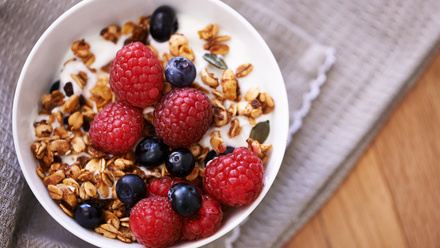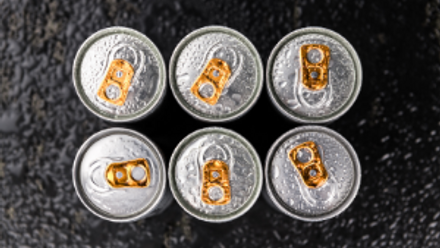Irritable bowel syndrome (IBS) is a medical term used to describe a collection of gut symptoms. Food can have an impact on symptoms.
Symptoms vary from one individual to another and can be worse for some than others. It is a very common condition affecting around one in five adults. An assessment for IBS should be considered if you have had any of the following symptoms for at least six months: abdominal pain or discomfort, bloating, or change in bowel habit.

A diagnosis of IBS should be considered only if there is abdominal pain or discomfort that is either relieved by defaecation or associated with a change in bowel habit. This should be accompanied by at least two of the following four symptoms:
- altered stool passage (straining, urgency, incomplete evacuation)
- abdominal bloating (more common in women than men), distension, tension or hardness
- symptoms made worse by eating
- passage of mucus
Other features such as lethargy, nausea, backache, and bladder symptoms are common in people with IBS and may be used to support the diagnosis. It is important to have a diagnosis of IBS confirmed and other conditions such as coeliac disease and inflammatory bowel disease ruled out. If you think you may be suffering with IBS, but also have any of the following symptoms, see your doctor to discuss whether a referral to a specialist may be required:
- unintentional and unexplained weight loss
- rectal bleeding
- a family history of bowel or ovarian cancer
- a change in bowel habit to looser and/or more frequent stools persisting for more than six weeks in a person aged over 60 years
What steps can I take if I have IBS?
Try to:
- eat three regular meals a day
- try not to skip any meals or eat late at night
- smaller meal sizes may ease symptoms
- limit alcohol intake to no more than two units per day and have at least two alcohol free days a week
- reduce intake of caffeine-containing drinks e.g. no more than two mugs (three cups) a day
- reduce intake of fizzy drinks
- drink at least eight cups of fluid per day, especially water or other non-caffeinated drinks, for example herbal teas, diluted cordial/squash
- cut down on rich or fatty/fried foods including chips, fast foods, ready meals and sauces, pies, samosas, batter, cheese, pizza, spring rolls, creamy sauces, snacks such as crisps, chocolate, cake and biscuits, spreads and cooking oils, and fatty meats such as burgers and sausages
- limit fresh fruit to three portions per day (one portion is 80g)
Helpful hints
- Take time to relax – mindfulness/meditation, yoga, aromatherapy or massage may help
- Take regular exercise such as walking, cycling, swimming
- Take time to relax while eating meals and chew your food well
- Keep a food and symptom diary whilst you are making changes so you can see what has helped
- Make one change at a time so that you can see what has helped
Symptoms
Dietary changes can often help IBS symptoms and sometimes simple changes are all that are needed.
If symptoms include bloating and wind
- Limit intake of gas-producing foods e.g. beans and pulses, Brussels sprouts, cauliflower, and also sugar-free mints/chewing gum
- You may find it helpful to eat oats (such as oat-based breakfast cereal or porridge) and linseeds (up to one tablespoon per day taken with at least 150ml of uncaffeinated fluid)
If symptoms include constipation
- Ensure that you drink six to eight glasses of uncaffeinated fluid per day to improve stool frequency and decrease the need for laxatives
- Try to gradually increase your fibre intake – any sudden increase may make symptoms worse. Rich sources include wholegrains, oats, vegetables, fruit, and linseeds. They help to soften stools and make it easier to pass
- Try adding one tablespoon per day of brown or golden linseeds (whole or ground) to breakfast cereal, yoghurt, soup or on salad. Have around a small glass/teacup (150ml) of fluid with each tablespoon of linseeds taken
- Avoid eating extra wheat bran
If symptoms include diarrhoea
- Replace lost fluids by drinking plenty of uncaffeinated fluid
- Limit caffeine intake from tea, coffee, and soft drinks to three drinks per day
- Try reducing intake of high-fibre food (such as whole-wheat breakfast cereals and wholemeal bread)
- Avoid sugar-free sweets, mints, gum and drinks containing sorbitol, mannitol, and xylitol
Fermented dairy and probiotics
You may wish to try yoghurt, a fermented milk drink such as kefir, or a ‘probiotic’ supplement.
If using a probiotic supplement, try one at a time and take it daily for at least four weeks to see if your symptoms improve. If it does not appear to help then you could try an alternative brand.
Further advice
Give your bowels time to adjust to any changes. If your symptoms persist after following general lifestyle and dietary advice, re-introduce the foods you have cut out and ask your doctor to refer you to a healthcare professional with expertise in dietary management, who can ensure your diet is nutritionally adequate whilst following a dietary intervention e.g. a dietitian. They may suggest that you trial a diet restricted in fermentable carbohydrates (also known as a low FODMAP diet). You could ask your doctor, health visitor or other medical staff to refer you to an NHS dietitian for support with this diet.
Alternatively, you can watch IBS webinars produced by specialist NHS dietitians on the NHS Patient Webinars website or search the BDA’s directory to find a private dietitian for you.
If dietary changes and medication have not helped your symptoms, you may find it useful to trial hypnotherapy or cognitive behavioural therapy (CBT).
IBS is not caused by food allergy. If you feel that you may be suffering with a food allergy, please refer to Allergy UK or Anaphylaxis Campaign for further information.
Top tips
- It is important to have a diagnosis of IBS confirmed and other conditions such as coeliac disease and inflammatory bowel disease ruled out
- Try simple dietary changes first – you may find that major changes are not needed
- Aim for regular, healthy, balanced meals
- Limit alcohol, caffeine, and fizzy drinks
- Take time to eat in a calm environment, chewing food well
- Take time to relax
- Keeping a food and symptom diary can help you to monitor the effect of any changes
- Make changes according to your symptoms
- If you try probiotics, probiotic yogurt or fermented milk drink, try one product at a time for at least four weeks
- Seek specialist advice if you are struggling or dietary intake becomes limited
Source(s)
- National Institute for Health and Clinical Excellence. Irritable bowel syndrome in adults. Diagnosis and management of irritable bowel syndrome in primary care. Clinical guideline 61 Update 2017 [04/04/2017]. Available from: http://www.nice.org.uk/Guidance/CG61
- McKenzie, Y. A., Bowyer, R. K., Leach, H., Gulia, P., Horobin, J., O'Sullivan, N. A., ... & Thompson, J. (2016). British Dietetic Association systematic review and evidence‐based practice guidelines for the dietary management of irritable bowel syndrome in adults (2016 update). Journal of Human Nutrition and Dietetics, 29(5), 549-575.
- McKenzie Y.A., Thompson J., Gulia P. & Lomer M.C.E. (2016) British Dietetic Association systematic review of systematic reviews and evidence-based practice guidelines for the use of probiotics in the management of irritable bowel syndrome in adults (2016 update). J Hum Nutr Diet. 29, 576–592.
- Public Health England in association with the Welsh Government FSSatFSAiNI. The Eatwell Guide. Public Health England, 2016 Contract No.: 9 August 2016.
- Palsson OS, Ballou S (2020) Hypnosis and cognitive behavioural therapies for the management of gastrointestinal disorders; Curr Gastroenterol Rep. 3;22(7):31







